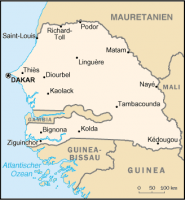The Electoral Commission of Senegal has released on Wednesday, the provisional results of the country’s parliamentary elections, held on 30 July 2017.
The results will be validated by the Constitutional Court before they are declared final. In the provisional results, The Coalition, Benno Boka Yakarr of incumbent President Macky Sall, has secured 125 of the 165 parliamentary seats.
Benno is also reported to have captured all the seven seats in the capital, Dakar and its environs.
In second place is Mayor Khalifa Sall’s Wattu Senegal, with a projection of 12 seats and the Mankoo Coalition, led by Former President Wade, with 8 seats.
At fourth position is the Party, PUR led by Serign Moustapha Sy won 3 seats, followed by Kaddu Askan Wi of Abdoulaye Balde, with 2 seats.
The remaining seats will go to smaller coalitions in the remaining 42 lists that were submitted by smaller coalitions.
Already, Mankoo has announced through its Spokesperson Moussa Sy, that it will petition the results in Dakar, citing electoral fraud.
Benno through Cisse Lo has indicated that it will contest the results in Touba and Mbacke where the Coalition lost.
The elections were keenly contested by 47 “lists” from various coalitions, parties and movements.
Political heavy weights including former President Abdoulaye Wade criss-crossed the country to sell their political programmes to the electorate.
As at now, the people’s verdict seems to favour Benno Bokka Yakarr.
The results also show that many political leaders have failed to win and others have lost in their bid to return to the National Assembly.
Big PDS party Wig, Omar Sarr lost his Dagana stronghold. The vocal Aida Mbodj of Bembey was defeated and the famous Jagne Fada lost.
Another political casualty was the flamboyant Lawyer/Politician Elhaj Diouf who failed in his attempt to return to the National Assembly.
The Academician Amsatou Sow-Sidibe was totally eclipsed. Even young and dynamic politicians like Malick Gakou, Abdou Mbaye, former prime minister and Cheikh Tidjan Gadio, former foreign minister were all rejected by the electorate and therefore denied access to the National Assembly.
With a list of 47 coalitions at district and national levels, the electoral system of Senegal may appear complex and complicated to our readers.
We therefore wish to offer you a synopsis on the system to facilitate your understanding.
Senegal’s National Assembly is unicameral and its members are elected by universal suffrage. There is a policy of parity between men and women.
The elections are based on a majority system in the country’s 45 districts.
The largest districts elect 7 members, while smaller ones elect a single member. For example, Dakar elects 7 members while smaller areas like Fatick, Kanel, Matam and Linguere can only elect 2 members each. The main criterion is demographic.
The greater the population, the bigger the number of representatives. As for the majority system, the list of candidates that obtains the most votes in a district obtains all the seats allocated.
For the voting system, a national quota is determined by dividing the number of valid ballots cast by the number of seats to be filled. Based on the total number of ballots cast, candidates are elected from the relevant lists in proportion to the number of quotas filled.
Now it’s up to the Constitutional Court to validate and confirm the results.
We will bring you the decision of the Court when it is given.

